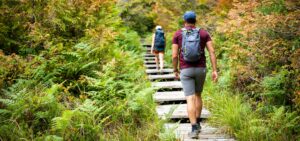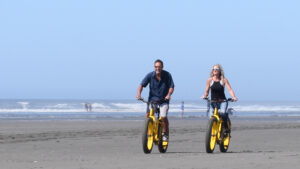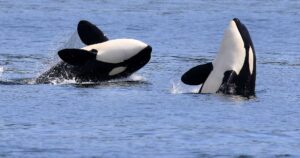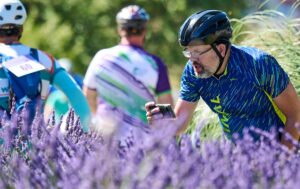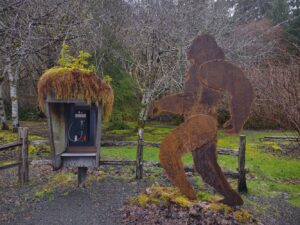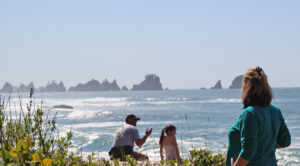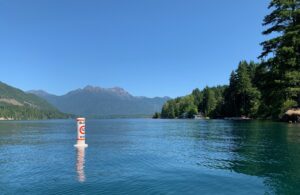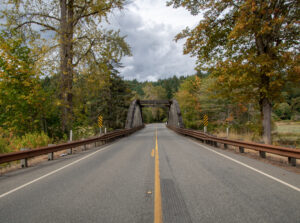Advice from a Park Ranger
Like many people, I was introduced to camping through my family. We used parks for camping, picnicking, boating, fishing, canoeing and kayaking. So, as I was growing up, going camping at parks was a favorite family activity. From my experience, here are a few tips for visiting Washington State Parks in Jefferson County.
Spending time in parks is an excellent way for families to engage with nature and develop a love and appreciation for the outdoors. There’s also a wellness benefit to getting outside, like hiking, biking, or taking walks on the beach. Parks are for everyone, from beautiful sandy beaches and majestic views to forested hiking trails.
Washington State Parks in Jefferson County
Jefferson County is home to a dozen Washington State Parks (WSP), each with a unique story to tell. Those offering camping can accommodate up to eight people per site. Camping gives you affordable access to everything parks offer for the entire family.
Visitors ask, “What is a typical stay like?” The answer is there’s nothing “typical” about camping and each park is different. Jefferson County’s parks offer a variety of camping opportunities from tenting to RV sites, group camps, cabins, vacation houses, and some retreat center accommodations.
Most parks are equipped with comfort stations with clean flush toilets. Some even have park stores or concession areas for purchasing firewood, camping necessities or treats.
Be Prepared

Beyond packing and knowing how to use the “Ten Essentials,” do some research about your destination. Read the facility’s web page. Check out the park’s information to learn what amenities are available. Be aware of any park alerts or important “Need to Know” information prior to your trip. You might want to know if fires are allowed and if so, is firewood available for purchase? Make a checklist and try to think of everything you may need. I often see our visitors have forgotten some gear or are short on supplies and then have to make a last-minute run to the nearest town or store.
Three Popular Destinations
Here are three state parks located in east Jefferson County.
Fort Flagler Historical State Park
Fort Flagler Historical State Park is a favorite year-round camping spot, with 1,451 acres surrounded on three sides by over 3.5 miles of walkable beaches. The park has 116 campsites for tents and RVs as well as five vacation houses for rent. There are trails with stunning scenery from the bluffs overlooking Port Townsend Bay and the Admiralty Inlet, historic Coast Artillery gun emplacements, and plenty of water access for boating, fishing, and beach walks. If you would like a kayak adventure in the local harbor, you can rent a kayak or take a guided tour adventure with Olympic Kayak Tours.
Fort Worden Historical State Park
Fort Worden is a 432-acre historical and multi-use park with more than two miles of walkable beaches. The park features a variety of services and facilities, including 80 campsites, a variety of overnight housing accommodations, a Coast Artillery Museum, Marine Science Center, and a full-service conference center. It is a popular destination for its trails, picnic areas, sandy beach, historic gun emplacements, and its many Victorian-era buildings. The park’s central location in Port Townsend makes it easy to fill your day with plenty of activities, shopping, and dining possibilities.
Dosewallips State Park

Dosewallips is a 1,064-acre park along the shoreline of Hood Canal. It features 123 campsites, 12 cabins, 3 platform tents, and is a popular destination for wildlife viewing and clam-digging. Visitors often witness an abundance of local wildlife including bald eagles, elk herds wandering through the area, and salmon making their return trip up the Dosewallips River.
Navigating Reservations
Planning as far ahead as possible is more important than ever. You can make reservations for Washington State Parks up to nine months ahead of your arrival. Start planning your next stay by searching WSP’s reservation system, online at goingtocamp.com or by calling in your reservation at (888) 226-7688.
For inquiries and reservations regarding the Fort Worden dormitories, vacation homes and other accommodations at the park, please contact Fort Worden Hospitality at (360) 344-4400 or visit online at fortworden.org.
Pack your Permit(s)
Every park is unique, and many require different passes to enter, with proceeds helping to keep the natural resource staffed and well maintained. The state parks are different from the national park. A Discover Pass is required for vehicle access to state parks for day use. You will need a pass for day use parking anywhere while in a state park. For more information about the Discover Pass and exemptions, please visit the Discover Pass web page discoverpass.wa.gov.
Shellfish and Crab Harvesting
Did you know that you can collect your next meal from the sea? Many parks along Puget Sound are great places to harvest clams and oysters. If you harvest shellfish yourself, make sure you have your shellfish license. Follow all posted beach advisories and closures to avoid illness. Know before you go and read posted warnings or call the Marine Toxins/PSP Hotline: 1-800-562-5632 for a regularly updated recorded message or go to the Department of Health Washington Shellfish Safety Map.

Be Courteous
Always be courteous by following all rules and regulations while you’re visiting or camping in the parks. Respect posted quiet hours and keep all pets on a leash. Make sure your campfire is always attended and fully extinguish it when done. Most parks have garbage receptacle facilities, but always plan to pack out what you pack in. Don’t leave any trash in the park or at your campsite. Parks are for everyone, so practice “Take only photos and leave only footprints” and you’ll be doing your part by sharing a great outdoor adventure with others.
By Guest Blogger Park Ranger Aaron Terada, Operations Manager for Fort Flagler Historical State Park & Retreat Center
Cover Photo: Fort Flagler Historical State Park courtesy of WA State Parks











